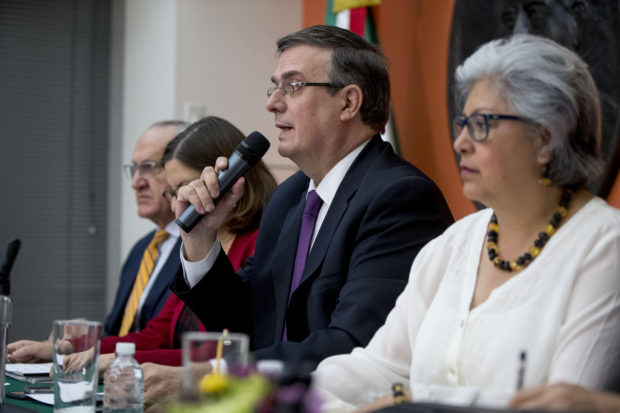US, Mexico officials to begin talks over tariffs, border
WASHINGTON – Mexico launched a counteroffensive Monday against the threat of U.S. tariffs, warning not only that it would hurt the economies of both countries but also could cause a quarter-million more Central Americans to migrate north.
A high-level delegation from the Mexican government held a news conference at the embassy in Washington, making the case against the threat by President Donald Trump of imposing a 5% tariff on Mexican imports by June 10.
It is unclear what more Mexico can do — and what will be enough — to satisfy the president.

Mexican Foreign Affairs Secretary Marcelo Ebrard, center, speaks at a news conference at the Mexican Embassy in Washington, Monday, June 3, 2019, as a Mexican delegation arrives in Washington for talks following trade tariff threats from the Trump Administration. (AP Photo/Andrew Harnik)
“As a sign of good faith, Mexico should immediately stop the flow of people and drugs through their country and to our Southern Border. They can do it if they want!” Trump tweeted Monday from London.
Trump’s Republican allies warn that tariffs on Mexican imports will hit U.S. consumers and harm the economy.
The president all but taunted negotiators for a quick resolution. “Mexico is sending a big delegation to talk about the Border,” the president tweeted Sunday.
Article continues after this advertisement“Problem is, they’ve been ‘talking’ for 25 years. We want action, not talk.”
Article continues after this advertisementBut Mexican Foreign Minister Marcelo Ebrard replied Monday that both countries working together is “the best way to do it.”
Mexico said it will only go so far to avert the duties, and absolutely ruled out a “third safe country” agreement that would require asylum seekers to apply for refuge in Mexico first.
“There is a clear limit to what we can negotiate, and the limit is Mexican dignity,” said Mexico’s Ambassador to the United States, Martha Barcena.
Barcena said Mexico has taken steps to offer migrants visas in Mexico, and “without Mexico’s efforts, an additional quarter-million migrants could arrive at the U.S. border in 2019.”
Barcena said Mexico has accepted 8,835 returned migrants as of May 29, and they are now waiting in the country for an asylum hearing in the U.S. courts.
The tariff threat comes just as the administration has been pushing for passage of the United States-Mexico-Canada Agreement, which would update the North American Free Trade Agreement, and top Republicans warned it could derail that effort.
U.S. Commerce Secretary Wilbur Ross met Monday with Mexican Economy Minister Graciela Marquez. Afterward, Ross said the two had discussed the tariffs and the “next steps” for the trade pact.
“I reiterated the president’s message that Mexico needs to do more to help the U.S. address immigration across our shared border,” Ross said in a statement.
Delegations led by Secretary of State Mike Pompeo and Foreign Relations Secretary Marcelo Ebrard will also meet in Washington.
Marquez told reporters her team is assessing potential reprisals in case the diplomatic efforts do not bear fruit this week. “We will have to make a strategic plan to take into consideration many elements,” she said.
Agricultural trade between the United States and Mexico was worth about $130 million a day last year, according to Mexican Secretary of Agriculture Victor Villalobos. A 5% U.S. tariff would decrease that trade by $3.8 million a day, he said.
Trump has been here before, issuing high-stakes threats, only to back off come crunch time.
Trump claims Mexico has taken advantage of the United States for decades but that the abuse will end when he slaps tariffs on Mexican imports.
His frustration with the flow of migrants is nothing new, but it’s a subject he often returns to, as he did last week after special counsel Robert Mueller’s rare public statement on the Trump-Russia report.
The president said last week that he will impose the tariffs to pressure the government of Andres Manuel Lopez Obrador to block Central American migrants from crossing the border into the U.S. Trump said the import tax will increase by 5% every month through October, topping out at 25%.
It swiftly refocused attention on the border issues.
Mick Mulvaney, the acting White House chief of staff, said on “Fox News Sunday” that the president is “deadly serious.” /gg